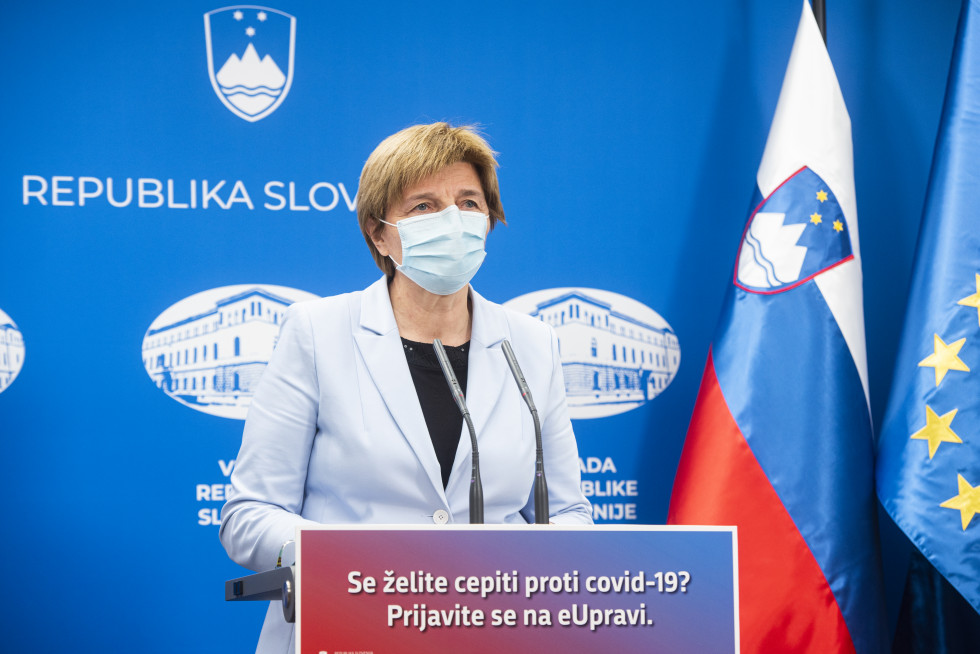First batch of vaccine arrives in Slovenia
During the first part of the press conference, Government spokesperson Jelko Kacin emphasised that the day before, on Christmas Day, 1,336 PCR tests were carried out and 358 new cases were confirmed. The share of positive tests was thus 26.8%. Moreover, 125 rapid antigen tests were carried out and 7 new cases were confirmed. The share of positive tests was 5.6%.
Thirty-nine COVID-19 patients were discharged from hospitals, while 80 persons were admitted anew. The day before, 80 persons had been admitted to the hospitals, while 106 patients were discharged.
Thus, 1,165 persons, 23 more than on Thursday, were hospitalised on Friday, while 209 persons required intensive care treatment, 8 more than on Thursday. Of a total of 25 deaths on Friday, 18 persons died in hospitals and 7 in homes for the elderly.
State Secretary at the Ministry of Health Marija Magajne confirmed that 9,750 doses of vaccine arrived in Slovenia on Saturday. The vaccine will be prepared on Saturday and transported to primary healthcare centres the next day. Mobile units of primary healthcare centres will carry out vaccinations in homes for the elderly on Sunday. Residents and employees of homes for the elderly who have not been infected with SARS-CoV-2 will be vaccinated first, with the aim of vaccinating as many residents and employees of homes for the elderly as possible.
By the end of the year, 16,575 doses of the vaccine will arrive in Slovenia, with as many people being vaccinated. Around the same number of doses is expected to arrive each week next year. After three weeks, persons will receive the second dose of the vaccine, to ensure the best protection possible.
Head of the Communicable Disease Centre at the National Institute of Public Health Mario Fafangel emphasised that it is not the vaccines that end the epidemic, but rather vaccination, which is the only means of saving lives. The decision to get vaccinated is completely rational, and there is no time for conspiracy theories or false alarms. There is no reason not to get vaccinated.
Herd immunity will only be achieved when at least 60% of the population have been vaccinated. The timeline to achieve herd immunity is therefore up to each and every one of us. Immunity following vaccination is longer-lasting than the immunity gained after recovering from the disease, but it is not yet clear how long it lasts. Some studies have indicated that immunity lasts at least eight months.
Regarding the events at the Krvavec ski resort, Mr Kacin noted Germany’s example, where ski resorts remain closed though the epidemiological situation is better. In Austria, the ski resorts are open, but the epidemic is under control. Many businesses had to close their doors during the holidays, including the ski resorts. Mass testing also took place during the pre-holiday period, which showed that the virus is still widespread in the population. On Tuesday, the National Assembly will deliberate the 7th package of measures to combat the epidemic, which also contains a provision stipulating that the state will cover the costs of rapid testing for large organisations, including the ski resorts. It is also important that we ensure that the students of the first three grades (first cycle) can re-enter schools on 4 January, which would require an improved epidemiological situation. Ski resorts will open once appropriate conditions for safe operation can be satisfied.
Regarding students re-entering schools, the Government is preparing mass testing for the employees of the first cycle, scheduled to take place on 2 and 3 January.
The number of hospitalised persons dropped to under 1,200, but the lifting of certain measures has to be approved by the Government. Meanwhile the epidemiological situation is improving and the Government is keeping a close eye on the progress. Vaccination will also considerably influence any future lifting of measures. On Sunday, a large number of elderly persons in homes for the elderly will be vaccinated. About 16,000 persons will be vaccinated each week, amounting to about 60,000 vaccinated persons per month. The Government will lift measures taking into account improvements in the epidemiological situation and the dynamic of vaccination.


